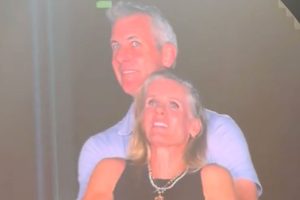Ilse Weber, who worked as a night nurse in the children’s ward of the Theresienstadt concentration camp’s infirmary, had the courage to secretly write poems and songs about camp life while her patients slept.
Weber, a Czech Jew, also sang her young charges to sleep with the lullabies she wrote, while playing the guitar. She perished in Auschwitz in 1944.
Cantor Deborah Staiman will discuss Weber’s life and music in a Holocaust Education Week program at the Kensington Place Retirement Residence in Toronto at 2 p.m. on Nov. 6. Along with her lecture, she will sing Weber’s seven surviving songs, accompanied by guitarist Brian Katz.
Weber’s Theresienstadt poetry was first collected in the 1991 book, Inside These Walls, Sorrow Lives. Her poems and songs, along with letters she wrote to a friend in England from 1933 to 1944, a personal testimony to the deteriorating situation of Jews in Czechoslovakia, were published in German in 2008. An English edition of Weber’s letters, poems and songs, called Dancing on a Powder Keg, came out in 2017.
Writing at Theresienstadt was an act of resistance. Weber was part of the German-Jewish confluence that the Nazis wanted to eradicate, but “she wasn’t going to be told to disappear,” Staiman said.
Weber was born in Czechoslovakia in 1903, when it was part of the Austro-Hungarian Empire. German was Weber’s mother tongue and was the language she wrote in and loved. She viewed herself as a good citizen who contributed to German culture, as is evident in this excerpt from a letter she wrote in 1939: “I’ve never done anything wrong, therefore I don’t need to fear the Gestapo … there are very few people that have worked as enthusiastically for German culture as I have.”
In the years before she was sent to Theresienstadt from Prague’s Jewish ghetto in 1942, Weber wrote books, stories, poems and theatre pieces for Jewish children. Her most popular book, Mendel Rosenbusch: Tales for Jewish Children, was published in 1929.
Along with the guitar, she played several musical instruments, including the lute, mandolin and balalaika, but her father wouldn’t allow her to pursue music as a career, Staiman said.
Following the Nazi occupation of Czechoslovakia in 1939, Weber and her husband, Willi, sent their eldest son, Hanus, to Sweden via a Kindertransport. Hanus Weber travelled to the United Kingdom first – the U.K. took in about 10,000 Jewish children from continental Europe – and was welcomed by the woman his mother corresponded with, Lilian von Loewenadler, the daughter of a Swedish diplomat.
When Weber’s husband was deported to Auschwitz in 1944, she volunteered to join him with their younger son, Tommy, to avoid breaking up the family. She and the boy were sent to the gas chamber upon their arrival. Willi Weber survived them by 30 years.
He hid his wife’s manuscripts in a shed at Theresienstadt before the family’s deportation and retrieved them after the war. Altogether, about 60 poems and seven songs, including three lullabies, survived.
The melodies of Weber’s songs about camp life are simple, delicate and spirited, in contrast to their dark content. Weber used rhyming verses in her deceptively simple song lyrics to describe the horrific, Staiman said.
READ: SUPER(STEIN) JAZZ SINGER IS MANY WORLDS APART
Weber’s Ade, Kamerad! (Farewell, Comrade) is an upbeat song about two camp inmates saying goodbye to each other because one of them will be taking the “Polish transport” to Auschwitz. “If you just heard the music, you’d think it was a happy song,” Staiman said.
The lyrics of Weber’s Ich Wandre Durch Theresienstadt (I Wandered Through Theresienstadt) include the line, “When will this suffering stop,” but it’s a very pretty song, Staiman added.
She will also perform Weber’s most famous song, Wiegala, a sublime lullaby that has been covered by many artists, including Swedish mezzo-soprano Anne Sofie von Otter.
Holocaust Education Week in Toronto runs from Nov. 1-8. For more information, visit holocaustcentre.com/HEW.






